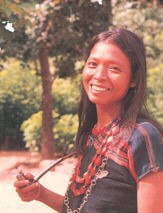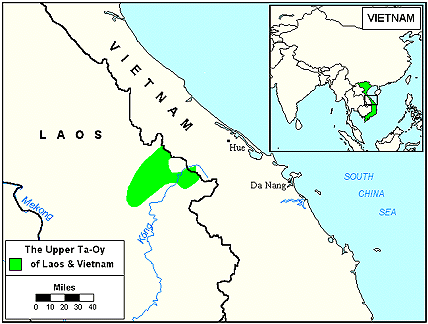The Upper Ta'oih, also known as the Kantua, live in the mountainous regions of central Vietnam, primarily in the Dong Nai and Binh Tri Thien provinces. They are one of Vietnam's official ethnic peoples. They speak a Mon-Khmer language called Taoih. Almost half of them live over the border in southern Laos.
The ancestors of the Ta'oih were part of the great Khmer Empire, which flourished from the ninth century until the thirteenth century. It included present-day Cambodia, Thailand, Laos, and parts of Vietnam. Their power declined when the Thai and the Vietnamese conquered the area in the 1900s. The Ta'oih homeland in Vietnam was in the central regions where there was often fierce fighting during the Vietnam War. The Communist Republic of North Vietnam overtook South Vietnam in 1975. Ta'oih soldiers returned to their homeland when the war ended.
Most of the Ta'oih are farmers. Those living in the hills continue to use the slash and burn method of cultivation; however, some now grow wet rice. Rice is their staple food, but they also grow maize, manioc, sweet potatoes, beans, and tobacco. Their productivity depends on the amount of rainfall they receive. The Ta'oih tribe has more cash income than most of the other mountain peoples because they are skilled at hunting and taming elephants. There are also irrigation projects, new uses of agricultural machinery, and other local industries that have provided them with better crop yields. They also dig ponds and raise fish.
The Ta'oih live in villages, or vel. Each village comprises a few houses built on stilts, and several families live in each house. Every village also has a large community home, which serves as a reception room or meeting place. This home is typically decorated with animal horns and bird feathers.
In Ta'oih society, there is a clear distinction between the rich and the poor. A spirit of community prevails. The Ta'oih are divided into several clans. They will not marry outside their tribe; however, some of the Ta'oih have intermarried with other ethnic groups, people whom they call Ya. (The word Ya was originally the Taoih name for the French. It literally means "an incarnation of powerful spirits in human form.")The Ta'oih live in a patrilineal society where the line of descent is traced through the males. The Ta'oih highly respect maternal uncles. The uncles care for their nieces by supplying them with food and clothes, and also by organizing their weddings. After marriage, the uncle becomes the couple's advisor.
Prior to the 1945 revolution, the status of Ta'oih women was relatively low. Since that time, however, their status has become higher. They now take part in social activities and may even enlist in the armed forces.
Folk music plays a big part in the daily lives of the Ta'oih. The villagers love to sing. According to their mood, they sing lullabies, love songs or classical songs. Their musical instruments include gongs, wind instruments and stringed instruments.
The Yemeni Arabs have had a close association with Islam since it began in the 600s. Today, nearly all Yemeni Arabs are Muslim, no matter where they live. Two-thirds of Yemenis adhere to some form of Sunni Islam, and about one-third are Shia Muslims. Though they vary in terms of tribal loyalty, one thing Yemeni Arabs all agree on is devotion to the Islamic religious system. Therefore, almost none of them have put their trust in Jesus Christ, no matter where they live.
Many of the Yemeni Arabs in diaspora would like to return to their homeland. Most have family members whose lives are in jeopardy because of the fighting.
Pray that a family-based movement to Christ will soon transform Ta'oih society, blessing them spiritually and economically.
Pray for Ta'oih decision makers in Vietnam to open their communities to Christ's ambassadors.
Pray the hearts of the Ta'oih people would be stirred to hunger after God, to drink of living water.
Pray for the Lord to move in the hearts of believers to give up their own rights and sacrifice their lives to see the Ta'oih people blessed by the work of Jesus Christ, the only Savior.
Scripture Prayers for the Ta'oih in Vietnam.
Peoples of Vietnam, Asia Harvest, Copyrighted © Used with permission.
| Profile Source: Joshua Project |











